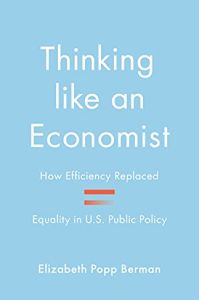US political discourse is replete with references to efficiency and cost-benefit analyses. But the economics-inspired jargon didn’t come from the Founding Fathers: Rather, the “economic style” of policy analysis entered American debate only after World War II, professor Elizabeth Popp Berman writes in this intriguing study. And by the start of the Reagan era, economic analysis had consumed policy debates, elbowing aside considerations of equity and justice. Berman does an admirable job of describing how a technocratic mind-set took over both public and private governance in the United States – and why it matters today.
American politicians and voters have grown enamored of policies that prize efficiency above all else.
In the United States, policy makers of all stripes embrace the “economic style of reasoning,” an informal school of thought that seeks to apply economic principles to policy decisions. This brand of thinking first appeared in Washington, DC, in the 1950s, and it gained momentum from the mid-1960s through the mid-1980s. This style takes its basics from Econ 101 – concepts such as incentives, efficiency and cost-benefit analysis characterize the economic style of reasoning. Over time, economic efficiency has become a basis for the way Americans think about politics. For instance, public investment in education isn’t about achieving lofty goals like learning and enlightenment but about workaday concerns, such as building human capital and raising per capita incomes. The economic style of thinking is spearheaded by doctorate-level economists, but the theories are familiar to anyone who has taken an undergraduate course in macroeconomics.
This approach rests on two major assumptions: The first is that markets are the most effective way to allocate...









Comment on this summary